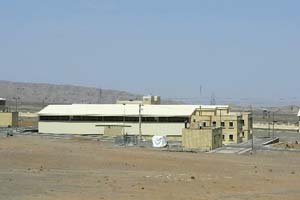
A view of Natanz uranium enrichment facility 155 miles south of the
Iranian capital of Tehran, March 30, 2005. (Xinhua/AFP file)
Iran removed seals on its nuclear research sites and resumed the fuel
research activities on Tuesday, despite international calls to refrain from
resuming sensitive nuclear work, a top nuclear official said.
Mohammad Saeedi, deputy chief of the Atomic Energy Organization of Iran, told
reporters here that the nuclear fuel facilities were unsealed and activities
there were resumed under the supervision of the International Atomic Energy
Agency (IAEA), the UN nuclear watchdog.
To dilute the sensitivity of the hardline move, Saeedi reiterated Iran's
position that the research work should not be viewed as related to the actual
production, promising to keep suspension on uranium enrichment.
"We think nuclear fuel research is different from the production. Our nuclear
fuel production will be continuously suspended," he stressed.
Saeedi hailed the IAEA's dispatch of inspectors to supervise Iran's
resumption, saying the agency had found a positive attitude.
A group of IAEA inspectors arrived here on Friday to supervise Iran's
resumption of nuclear research activities after its dissuasion effort failed.
Saeedi expressed hope that Iran and Europe would reach a logical agreement on
Iran's nuclear program.
Meanwhile, the IAEA's spokeswoman Melissa Fleming in Vienna confirmed that
Iran had removed seals on its fuel research facilities in the presence of
inspectors from the agency.
Iran announced last week that it would resume work on the nuclear fuel
research on Monday under the supervision of the IAEA,which it suspended two and
a half years ago.
The announcement drew threats from the United States to refer the Iran
nuclear case to the UN Security Council for punitive economic sanctions.
Washington accuses Iran of pursuing nuclear weapons under the cover of
peaceful and civilian usage.
German Foreign Minister Frank-Walter Steinmeier on Monday also blasted Tehran
of breaching the commitments and warned that it could "not remain without
consequence".
However, Iranian Supreme Leader Seyed Ali Khamenei said on Monday that Iran
would not give in under the pressure of sanctions,citing Iran's history of "self
sufficiency".
"Certain states are after imposing economic sanctions on Iran through
propaganda campaigns against its nuclear program. Economic sanctions on Iran
could not work in the past. Instead, it encouraged the students and young
scientists to work for self-sufficiency of the nation," Khamenei said at a
gathering.
Iran's defiant move would put an upcoming round of nuclear talks with the
European Union (EU) on Jan. 18 in jeopardy, as what the union has warned.
Iranian Deputy Foreign Minister Mahdi Mostafavi said on Saturday that Iran's
resumption of fuel research should not have any influence on the process of the
talks.
The United States accuses Iran of developing nuclear weapons secretly, but
Iran terms the charge as politically motivated,insisting that its legal rights
on peaceful nuclear technology are undeniable.
The EU, which has been acting as the broker of the Iranian nuclear issue,
holds that Tehran's complete command of uranium enrichment, a key process for
nuclear fuel cycle construction, would lead to military usage.



